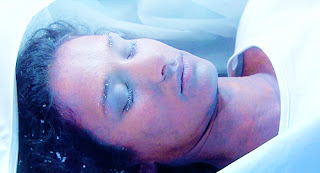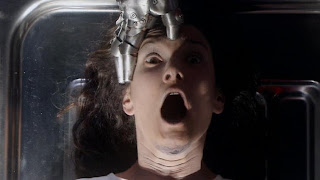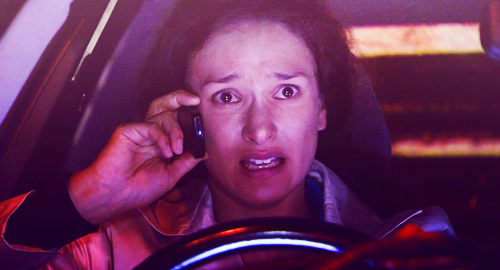The quality of your story can be judged based on one simple
thing: the quality of your villains. Okay, so that’s not entirely true. Lots of
good villains show up in mediocre movies, and there are a few, though not a
lot, of movies with a mediocre villain but an awesome plot. For the most part,
however, good villain means good movie.
Why is that? Well, for starters, the quality of the villain
is directly related to the quality of the story in general. A good villain
hopefully means that the conflict in the story is engrossing and genuinely
emotionally distressful. Without a strong conflict there’s nothing for your
hero to overcome, and without anything to overcome, your story is going to
suck.
This isn’t just talking about villains who happen to be
walking, talking humanoids either. Lots of movies have a villain, even if that
villain is just an idea. In Buffy’s
Season Six, the villain, the real big bad, is life itself, or the idea of
growing up. Arguably, that’s the villain throughout the whole show, and since
that is a fantastic villain, it’s a fantastic show.
It also works on a micro scale. When you look at individual
episodes or specific books or whatever, the mini-villain needs to have a
motivation that adds something to the agenda of the maxi-villain. Why? Because
ideally you want your story to be tonally consistent, and having villains whose
goals are clear and also related is a good way to make sure that your point
gets across.
Your villain should externalize the main conflict of the
story, and as such, your villain should be complex and interesting as hell. Or
at least as complex as your conflict is.
With that in mind, let’s talk about Torchwood.
We’re going to be doing a little mini-series on Torchwood over the next couple of weeks,
because the show is both interesting, and it’s a spinoff of Doctor Who which has its fiftieth
anniversary in a few months, and it gives perfect examples to a bunch of things
I happen to want to talk about. So that’s nice.
Today, though, we’re going to start big. What is Torchwood about? Not what is the story,
though we’ll talk about that, but what is the point of this story? Why this
story, and why now?
Well, I’m pretty sure that Torchwood, for all it dresses up as a campy sci-fi alien hunting
show, is actually about the least funny thing (and also one of the most funny
things), death.
Why do I say that? To explain that, I have to explain what
the story is.
Torchwood, like I
said, is a spinoff of Doctor Who. It
follows Jack Harkness (John Barrowman), a character first introduced in the
first season of nuWho, who cannot die. He is, at the start of Torchwood, about two hundred years old,
and waiting for the Doctor to come back and explain why on Earth he can’t die
and why he got left on that space station. Stuff like that.
Jack heads up Torchwood Three, a governmental agency
commissioned with hunting down all the random space gunk that ends up in
Cardiff, Wales. Cardiff is located on a rift in time and space, and sometimes
things slip through. Alien artifacts, travelers from another time, aliens
themselves. It can be helpful, harmful, or just confused. Whatever way,
Torchwood is the agency that has to clean it up.
The story of the show follows PC Gwen Cooper (Eve Myles), a
humble copper who stumbles across Torchwood one night, and ends up helping in
their investigation. When they find themselves with an opening on the team,
Gwen gets the job, and enters into the wild and wacky world of alien hunting.
 The team itself consists of Dr. Owen Harper (Burn Gorman),
their resident doctor and medical expert, Toshiko Sato (Naoko Mori), their
technical expert, Ianto Jones (Gareth David-Lloyd), the team’s Alfred
basically, and Suzie Costello (Indira Varma), Jack’s second in command.
The team itself consists of Dr. Owen Harper (Burn Gorman),
their resident doctor and medical expert, Toshiko Sato (Naoko Mori), their
technical expert, Ianto Jones (Gareth David-Lloyd), the team’s Alfred
basically, and Suzie Costello (Indira Varma), Jack’s second in command.
By the end of the first episode, Suzie is dead and Gwen has
her job. Because it turns out that alien hunting has a pretty short shelf-life.
And also because Suzie was the villain.
SPOILERS
It’s good to know this going in, but literally everyone on
the show, with the exception of Gwen, dies. Jack dies all the time, so it
becomes increasingly ordinary, but the others only get to die once, or at most,
twice.
Their deaths are traumatic, difficult, and always a cause
for tears and recriminations. But it’s Suzie’s death that starts it all off and
which establishes the villain of the show. The villain is death. All death.
Every death. And the villain will always win.
That seems a bit bleak, but it’s true. Death will, and
should, always win. Suzie’s problem, the reason she became a villain in the
first place, is because she is afraid of death and therefore she wants to
master it. In this first episode, the main mystery centers around a series of
murders. These murders, committed with a very weird knife, get Torchwood
involved, and therefore get Gwen involved with Torchwood.
 The murders themselves aren’t Torchwood business, they’re
just a way for the team to test a metal gauntlet that raises the dead. Oh yeah,
stuff’s about to get weird. This gauntlet, that Ianto calls the “Risen Mitten”,
raises the dead for a matter of seconds, and then lets them die again. It’s
useful for interrogations of murder victims, but they don’t really know how it
works, so they’re testing it out on every dead person they can find.
The murders themselves aren’t Torchwood business, they’re
just a way for the team to test a metal gauntlet that raises the dead. Oh yeah,
stuff’s about to get weird. This gauntlet, that Ianto calls the “Risen Mitten”,
raises the dead for a matter of seconds, and then lets them die again. It’s
useful for interrogations of murder victims, but they don’t really know how it
works, so they’re testing it out on every dead person they can find.
Suzie, who wields the glove, wants to know how it works
better than anyone, so she takes matters into her own hands. She kills people,
and uses the glove to revive them. Eventually the team finds out, or more
accurately, Gwen figures it out and tells Jack, and Suzie is forced to choose
between her team and her power. She chooses power, and she dies for it.
But then, she comes back.
In the incredibly aptly named episode, “They Keep Killing
Suzie”, we discover that Suzie was a pretty complex lady. Not only did she go a
little insane and start killing people, she was also trying to deal with some
gnarly PTSD symptoms and going to weekly therapy groups. Oh, and brainwashing
people in those groups to start killing people if she didn’t reset their
programming every few months, in case she ever died. There’s that too.
Through Suzie’s machinations, she’s brought back by the
Risen Mitten, only this time, she doesn’t go back to being dead. Instead, she
seems to be transferring her death to Gwen, the only person in the team who
still likes her, and whose compassionate heart made her the best victim.
And then Suzie dies, again, a lot, and the team goes back to
normal. Well, as normal as a team of alien-hunters in Wales can be.
 Suzie’s sort of a two-off villain, and she’s not very
important in the larger scheme of the show, but that’s what makes her so
remarkable and well written. Because even though she’s not the big bad, she as
a minor villain is intrinsically related to the major villain. She is a tiny
representation of Death and what it does to us. You can judge a show by the
villains.
Suzie’s sort of a two-off villain, and she’s not very
important in the larger scheme of the show, but that’s what makes her so
remarkable and well written. Because even though she’s not the big bad, she as
a minor villain is intrinsically related to the major villain. She is a tiny
representation of Death and what it does to us. You can judge a show by the
villains.
She isn’t just a mindless death obsessed person, either.
Suzie is a complex, interesting, genuinely deep person, who happens to be
incredibly screwed up and prone to, you know, killing people. But she had an
affair with Owen, she deals with feelings of being replaced and being useless
now (after she comes back to life and discovers Gwen has her job), and she
feels alone and sad and afraid. She’s deep. And she’s still evil. I like that.
I think, ultimately, this is what inspired my confidence in Torchwood as a show. Because Season One
really isn’t very good as a whole, and Season Two is better, but not amazing. Torchwood: Children of Earth, the Season
Three miniseries, is seriously spectacular, but Torchwood: Miracle Day, the erstwhile Season Four, is one of the
worst things I have ever seen. So all in all a mixed bag.
And that’s why Suzie matters. She’s the first villain we
meet, and when you look at the show, at all of its inconsistencies and
ridiculous moments, through that lens, the show is amazing. It’s about death
and life and how our fears can shape us if we let them. It’s about how death is
coming for all of us, no matter what, and all we can change is how we greet it.
And it’s about doing your best with the time you’re given.
We know that, because Suzie showed us first. In an evil,
twisted way. Which is awesome.




For a second when I saw you wrote something about Suzie I thought you were going to say she wasn't a villain and I got worried.
ReplyDeleteYeah, Death is definitely seen as the series villain in S1-3. And kind of the savior in S4.
I thought it was really interesting that they didn't just fear dying but no longer existing. There was a running theme that death might mean oblivion and that there was no afterlife, just eternal darkness or a void. Since I read a lot of spiritual books I kept screaming at the tv screen, "You were probably just in a limbo! A place in between dimensions/spheres! Your inability to let go of your physical life and inability to enter your spiritual life trapped you in the 'tunnel' part of crossing over! It's no different from closing your eyes to go to sleep and just seeing darkness, you just came from seeing light and having let yourself start to dream yet so you think the darkness is all there is!"